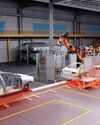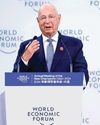
TRAINS BUILT EAST PALESTtine. Through the 19th and 20th centuries, the Ohio town grew up around the freight-rail tracks that carried goods, fuel, and chemicals between the industrial centers of the Midwest. But when that industrial system declined, East Palestine's community didn't fall apart. Young people stayed, had children, and sent them to local schools. New residents moved in and started small businesses. It wasn't paradise, but it was quiet and safe, the type of place where you knew your neighbors. For many of the population of 4,700, it was enough to fulfill the town motto: "The place you want to be."
Then, on a cold February night a year ago, 38 train cars derailed and burst into flames. Firefighters fought the blaze for hours before the local fire chief pulled them back because of concerns for their safety. Some of the tankers contained hazardous cargo such as butyl acrylate, a fluid used to make polymers. Many residents in town were evacuated. Believing that five tanker cars of vinyl chloride, which causes cancer in humans, were likely to explode, emergency-response contractors and local officials decided to burn off their contents. After the accident, the railroad company (Atlanta-based Norfolk Southern) and the U.S. Environmental Protection Agency (EPA) assured residents that the town was safe. But in the weeks and months that followed, many residents of East Palestine fell ill.
Esta historia es de la edición February 12, 2024 de Time.
Comience su prueba gratuita de Magzter GOLD de 7 días para acceder a miles de historias premium seleccionadas y a más de 9,000 revistas y periódicos.
Ya eres suscriptor ? Conectar
Esta historia es de la edición February 12, 2024 de Time.
Comience su prueba gratuita de Magzter GOLD de 7 días para acceder a miles de historias premium seleccionadas y a más de 9,000 revistas y periódicos.
Ya eres suscriptor? Conectar

Q & A: Borge Brende
The World Economic Forum president talks with TIME editor Sam Jacobs

Q & A - Rene Haas
Arm's CEO on how his hardware is supporting the Fourth Industrial Revolution

The conflicts looming over 2025
WHEN DONALD TRUMP TOOK THE OATH OF OFFICE AS President in January 2017, his first foreign policy priority was to get tough on China. The Trump 2.0 Administration will continue that work. But when he strides back into the Oval Office in January 2025, Trump will also become responsible for U.S. management of two dangerous wars, the kinds of hot foreign policy crises he was fortunate to avoid during his first term.

Rev Lebaredian
Nvidia's vice president of Omniverse and simulation technology on training AI-powered robots

5 predictions for AI in 2025
New uses and policy questions come into focus

Roy Wood Jr. The comedian on his new stand-up special, the importance of working in food service, and learning from Keanu Reeves
8 QUESTIONS WITH Roy Wood Jr.

A call for global cooperation in the Intelligent Age
Cultivate wisdom along with innovation

The D.C. Brief
IN THE END, THE THREAT OF A FARright revolt proved more menacing than most imagined, as Republican Mike Johnson initially came up short on Jan. 3 during the first balloting to keep him as Speaker.

The digital labor revolution
OVER THE PAST TWO YEARS, WE'VE WITNESSED advances in AI that have captured our imaginations with unprecedented capabilities in language and ingenuity. And yet, as impressive as these developments have been, they're only the opening act. We are now entering a new era of autonomous AI agents that take action on their own and augment the work of humans. This isn't just an evolution of technology. It's a revolution that will fundamentally redefine how humans work, live, and connect with one another from this point forward.

Tech we can trust
Serving humanity's best interests must be at the center of progress